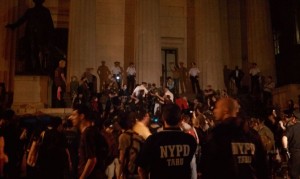Today is the seven-month anniversary of OWS. It coincides with a remarkable ratcheting up of pressure on Occupy from authorities of all kinds–personal, police, professional. At the place where these three roads meet is the Law, saying: “enough, time to concede.” The reply is given: “I prefer not to.” But it’s getting much harder.
Now some of my friends and colleagues give me a look: “Occupy? Still?” As if you had just discovered deconstruction. So, yes, I am a bit obsessed. Since when was that a bad thing in professional life? and it’s been seven months, not years.
By unrelenting hostility and willingness to improvise the terms of the law, the police do now have the upper hand in the streets. The NYPD yesterday determined that you may not have “moveable property” on the sidewalk in New York– and that did apparently include a dog that one of the occupiers had on Wall Street. The primary target of the police is the cardboard sign, now that the tent has been outlawed. The revived “sleepful protest” has been driven onto the steps of the Federal Hall, where the Bill of Rights was first introduced. It is supposed to feel like a last stand. While I don’t think it is, I feel the pressure.
As mentioned yesterday, the academic left continues to ratchet up its critique of Occupy. Jodi Dean posted a talk on her website yesterday, which is at once supportive of the movement for creating a new political subject, and wants to see it regulated by the Holy Trinity of Badiou, Lacan and Zizek. Here’s her summary:
Bluntly put, some of the ideas that most galvanized people in the fall—those associated with autonomy, horizontality, and leaderlessness—have also come to be faulted for conflicts and disillusionment within the movement.
I haven’t heard this criticism, except in what you might call the academic wing of the movement, but there you hear it all the time.
I can’t get into a full analysis of this paper because she asks us not to cite it, so you’ll have to read it yourself. In short, she argues that Occupy should accept its own condition of “lack” in relation to the “lack” it has identified in the political system (The Big Other) and thereby set about representing the overlap created. While I’m not fully sure what to make of this, I take it to mean that if Occupy is to create a form of collectivity, it has to respect the laws of kinship or disintegrate. Occupy should thus negate its own negation of the political system. I can’t help but feel that it would no longer be Occupy were that to happen and in considerable part that transformation would come from a reassertion of the traditional authority of the Law, as Lacan would have had it. Not to mention the law as the cops have it. What we could gain by the strategy is opaque to me.
Is this Law unchallengeable? By chance, I’ve been reading Judith Butler’s lectures on Antigone, where she discusses the possibility of a “post-structuralist” form of kinship that would not be dependent on the Law of the Oedipus complex. She notes that in Oedipus at Colonnus, none other than Oedipus himself berates Antigone and her sister for being out of place, even as they take care of him instead of their brothers, “in their place.” Even Oedipus gets to castigate Antigone for asserting a willingness to “live out of doors.” His curse on his children/siblings is the re-assertion of the necessity of staying in place. That is to say, anyone transgressing their alotted role will be punished. The place one must be is the place where three roads meet and Oedipal destiny is enacted.
What if the incest taboo is not the only form of establishing kinship? What if kinship is not destiny? As the results of incest, Antigone and her siblings all embody the failure of the Law and, while they are punished for this, they also claim glory and honor of their own. Butler interestingly footnotes here the enfant terrible of anthropology Pierre Clastres. Like Sahlins, Clastres refused to equate power with kinship. Clastres asserts that the kinship system tells us almost nothing about the social life of a people. He further argued that the Amazonian peoples he studied were determined to prevent the emergence of permanent inequality by means of careful safeguards.
These arguments have been developed by David Graeber, who also notes that Clastres’ romantic over-investment with the Amazon prevented him from discussing the widespread use of sexual violence in these same “egalitarian” societies. He astutely concludes
Perhaps Amazonian men understand what arbitrary, unquestionable power, backed by force, would be like because they themselves wield that power over their wives and daughters.
The point of the Antigone myth and the Amazonian egalitarians is, then, not that we want to be like them, but that these moments show cases where the “universal” Law does not apply, and is therefore not universal at all, but particular and backed by force of various kinds.
That’s why “I Fought The Law” is a counterculture classic: not because it celebrates a victory–the law won–but because it discovers that, unlike Bartleby who negates himself in the end, you can fight the law. And, yes, you can lose.


